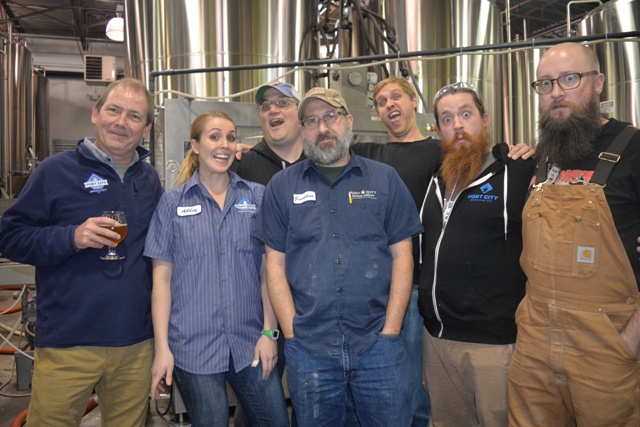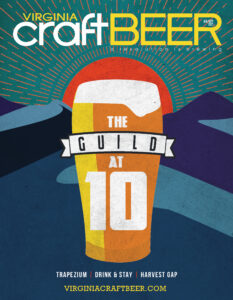
Bill Butcher (far left) and his brew crew at Port City
By Jeff Maisey
Competitions are a funny thing.
They are like sporting events where on any given day a team can win.
Take Alexandria, Virginia’s Port City Brewing Company. The brewery, which will mark its 5th anniversary in January, has entered its flagship beers in regional and national competitions. They’ve earned medals and trophies many times, but never have they been crowned Small Brewery of the Year in the Super Bowl of competitions known as the Great American Beer Festival until this year.
Port City was one of four craft breweries to win three medal; their two silver (Monumental IPA, Porter) and one bronze (Optimal Wit) made them the overall winner in Denver.
I recently caught up with Bill Butcher, owner of Port City Brewing Company, to discuss the Denver experience and to learn about the brewery’s plans ahead.
Each year Port City participates in the Great American Beer Festival. You enter beers. Some win, some do not. From your perspective, how is it that one year the same beers entered win nothing, and the next you take home the trophy for Small Brewery of the Year with the very same beers?
It was a great experience. As you said, we travel to Denver for the Great American Beer Festival every year since we opened in 2011. We’ve won eight medals in those years.
Our first medal was in 2012. We won a bronze for Monumental IPA. We always enter our flagship beers. That is really our bread and butter. Those are the beers we make every day and that people can buy every day. We feel it is important to make that part of our entrees into the Great American Beer Festival.
And, yeah, some years you win a medal and some years you don’t. But this year was certainly a tremendous honor to win three medals and win Small Brewery of the Year.
The best part of the whole experience this year was the fact that we closed down the brewery for three days, brought our whole brewing team as well as our sales team out to Denver to be together for the festival. The stars aligned just right and it was a tremendous experience for everybody to share together in the moment.
What did your crew learn from the experience? Is it easier to digest not winning one year knowing that the same beers could win the next depending on who the judges are and all the nuances associated with the process?
We go into this thing every year with the expectation of not winning anything at all. Most of the people in the festival hall in the awards ceremony leave without winning a medal. It is extremely competitive. I always emphasis to all of our team not to expect anything, and expect to go home like most of the brewers do without any medals. It’s cool because when you’re sitting there people all around you start winning medals, jumping up and cheering. You can cheer them on as well. You hope they will cheer when you win a medal.
But, really, we go in there with zero expectations. To win one medal is a tremendous honor. To win three the way we did this year was really off the charts.
I’ve been going to the Great American Beer Festival since 2009. The event itself has about doubled in size. Every year is gets more and more competitive and harder to win medals. There are more beers and breweries every year in the competition.
This year was the hardest it has ever been to win Small Brewery of the Year. Next year will be even more competitive. That is the fun of it.
Can you speak to the current state of the craft beer industry in Virginia?
Yeah, it’s great to see. The market keeps growing. The Virginia craft beer business is growing. It has never been better.
We’re still at a point where there’s a lot of room to grow. There is so much interest in what we do with beer drinkers all across the state. Beer tourism is growing.
When it is all said and done, years from now we’ll look back on these days as the Golden Age of Craft Beer, not just in America but in the state of Virginia.
Virginia always does very well in these competitions. In 2013, Virginia was fourth in medals won. The three states that finished ahead of us were California, Colorado and Oregon. That really put the state of Virginia on the map. The bar is now set really high in the state so for new breweries coming in the expectations are going to be high because there’s such great beer being produced all over the state. That’s a good thing for all of us. We push each other for better quality that way.
Your distributor in the Hampton Roads market has sold its product line to AB distributors Hoffman Beverage Company and M. Price. Do you anticipate stronger sales as a result?
Oh, yeah, definitely. We’re making a bigger push all across the state of Virginia. We’ve got a bigger presence in Richmond, the Shenandoah Valley, and now with the transfer of our brands to more established craft beer distributors in the Tidewater area it is going to make our beers easier to find.
We are naturally going to sell more if we have more people representing the beer out in the market. We’ll also expand our sales force down there for more presence. We look forward to great things coming from the eastern part of the state.
What are you current top three sellers?
The top three sellers are Optimal Wit. It has been our number one seller since the day we opened. Our second best selling beer is our Monumental IPA. Our third best seller is our Porter. Those three beers happened to be the ones that won medals this year at the Great American Beer Festival.
When we talked last year you explained how you came from the wine business and liked the craft beer industry because of its focus on flavor. Have you been validated in your decision?
Oh, yeah. We’ll be celebrating five years in business in January. Jonathan Reeves, our head brewer, and I both feel that we’re still in this frantic start-up mode at times where we’re learning something new each day. We’re kind of figuring things out as we go, and we’re having a lot of fun. It’s an exciting time for us and we still feel very energized about the future of the company.
As far as lessons learned from the wine business, I still believe the beer business is more fun; a lot more laid back. The people seem to have more fun with craft beer than we ever did with wine.
When I was in the wine business everyone would look to the wine expert to tell them what they should be tasting in a wine. When we did a tasting or a wine dinner the attendees would look to me to tell them what they should be tasting and what they should think about a wine. That is very different from the craft beer business where everybody already has an opinion about a craft beer, what they like and don’t like. Beer drinkers also tend to be very interested in sharing that opinion with you, which I think is great.
Have you had to add fermenting tanks over the past year? What is your plan moving forward in terms of greater capacity in the brew house?
Yes, we’ve added more tanks. When we leased this warehouse we leased a space that was greater than we needed so we could have a space to grow into rather than grow out of before we were ready. Every year since we’ve been open we’ve added capacity. We’ve upgraded our utilities and systems.
We added four more 120-barrel tanks in the past nine months. That has helped us meet the demands.
We have several more years of growth within this space. Then we’ll figure out what to do after that.
Is the DC Metro area still your primary customer base? What are your expansion plans?
Most of what we do is Metro DC. I consider it the Beltway – suburban Maryland, the District of Columbia, Northern Virginia. That’s where we do 85% of our wholesale business.
After that we do sell statewide in North Carolina, throughout the state of Maryland; we sell in metro New York,; we just opened up Connecticut this week. We’ll open up Delaware in the spring.
Our goal in the next three years is to finish out our Mid-Atlantic footprint. Our goal all along has been to be an influential brewer in the Mid-Atlantic region. That’s what we’re going to stick with.
Will you add beers to your flagship lineup or will you seek to strengthen the visibility of the current brand within the markets you just named?
Our focus right now is developing a deeper footprint within our core markets. That is the Metro DC market and the rest of Virginia. There’s a lot of ground to cover and Virginia is a great beer market. DC is a great food and drink market. You don’t have to go very far to sell all the craft beer that we can produce.
Some restaurants in Virginia are starting to complain that craft breweries are turning into entertainment facilities and harming their sales. Is this a potential problem for the craft beer industry?
I can speak for what we do here. I’ve never looked at this as an entertainment venue. People do come here and have a good time. We occasionally have live music. We do other things such as beer yoga. We have a fun run every Monday night. We do a lot of charity events. So we’re always looking for ways to bring people together. This brewery seems like a great way to do that, but we never want to compete with the restaurants and bars in our area. I see us as a supporter of theirs. If they buy our beer then I’d rather go to their place and support them. I never want to be seen as a competitor to them. That’s one of the reasons why we close at 9:00 PM. We ring the bell and then people out to the bars and restaurants of DC and Northern Virginia.


